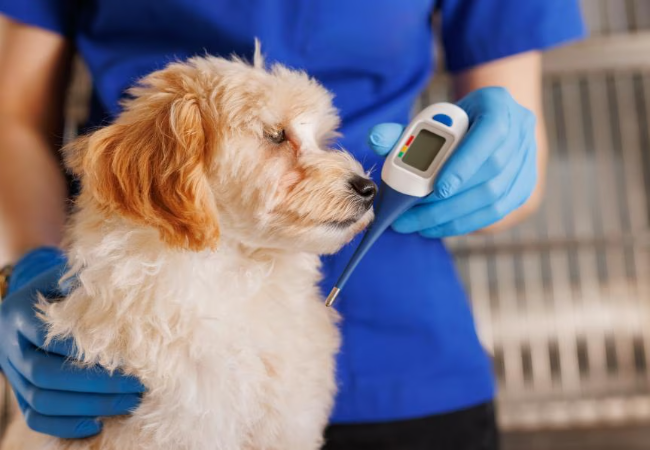Why Your Dog Feels Hot: Causes, Signs, and When to See a Vet 🐶🔥

In this article
Why Your Dog Feels Hot: Causes, Signs, and When to See a Vet 🐶🔥
By Dr. Duncan Houston BVSc
If your dog feels unusually warm, it could be due to normal body responses or indicate an underlying health issue. Understanding the possible causes and accompanying signs can help you determine when to seek veterinary care.
Possible Reasons Your Dog Feels Hot
-
Fever: A dog may develop a fever due to infection, inflammation, or illness. Signs of fever include lethargy, shivering, vomiting, red eyes, coughing, or noticeable changes in behavior or mood.
-
Environmental Heat: Hot weather, sun exposure, or recent physical activity can raise your dog’s body temperature.
-
Stress or Excitement: Anxiety, fear, or excitement can temporarily increase your dog’s warmth.
Normal Body Temperature: A healthy dog’s temperature typically ranges from 99.5°F to 102.5°F (37.5°C to 39.2°C). Temperatures above this range warrant a consultation with a veterinarian.
Other Signs of Potential Health Issues in Dogs
Apart from feeling hot, there are additional signs that may indicate illness:
-
Changes in Appetite or Thirst: Sudden increases or decreases in eating or drinking, or unexplained weight loss/gain, can signal health problems.
-
Urinary or Defecation Issues: Changes in frequency, consistency, or the presence of blood in urine or stool may indicate urinary tract or digestive issues.
-
Lethargy or Anorexia: Unusual tiredness, disinterest in play, or refusal to eat for more than 24 hours can point to illness.
-
Behavioral Changes: Sudden aggression, excessive panting, restlessness, or unusual anxiety may indicate discomfort or illness.
-
Pain or Discomfort: Limping, difficulty sitting/lying down, wincing when touched, or excessive licking/chewing of a specific area should be evaluated by a vet.
-
Skin, Ear, or Eye Problems: Redness, inflammation, sores, hair loss, frequent scratching, head shaking, balance issues, discharge, or cloudiness in the eyes require veterinary attention.
-
Vomiting or Diarrhea: Persistent vomiting or diarrhea, particularly with blood, could indicate a serious condition and warrants immediate veterinary care.
Monitoring and Next Steps
Feeling warm doesn’t always mean your dog is sick, but monitor their behavior and any accompanying symptoms closely. If your dog seems uncomfortable, behaves abnormally, or you are unsure about their health, consult a veterinarian promptly.
A vet can provide a thorough examination, run necessary tests, and guide you on the best course of action to ensure your dog stays happy and healthy.



